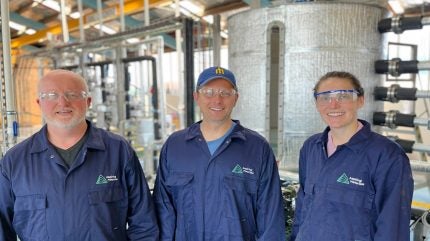
Aspiring Materials, a company specialising in the extraction of critical minerals, has announced its expansion into the US market.
This move is set to address the pressing need for secure and sustainable access to critical minerals, which are vital for various industrial processes and clean energy technologies.

Discover B2B Marketing That Performs
Combine business intelligence and editorial excellence to reach engaged professionals across 36 leading media platforms.
The company’s patented, waste-free extraction process from olivine rock positions it as a potential key player in reducing the US’ reliance on imported minerals.
The US currently faces significant risks in sourcing critical minerals like magnesium and nickel-cobalt-manganese (NCM) hydroxides.
Industries heavily depend on imports, exposing supply chains to geopolitical tensions and environmental issues.
Aspiring Materials’ expansion follows the success of its pilot plant in Christchurch, New Zealand, and the company plans to establish its first US commercial-scale operation in Washington State, with other locations under consideration.

US Tariffs are shifting - will you react or anticipate?
Don’t let policy changes catch you off guard. Stay proactive with real-time data and expert analysis.
By GlobalDataThe Christchurch facility, operational since March 2025, has demonstrated the scalability of this eco-friendly method.
Aspiring Materials’ innovative approach to mineral extraction utilises olivine, an abundant and low-cost rock, to produce magnesium hydroxide, NCM hydroxide and reactive silica.
The company said its process is completely circular, generating zero waste and no carbon dioxide emissions, not only avoiding environmental damage but also offsetting carbon emissions.
For every metric tonne of olivine processed, up to 1.6 million tonnes (mt) of CO₂ can be offset.
The byproducts of the process, including saltwater, oxygen and green hydrogen, are further utilised, ensuring that every output contributes to additional value creation.
Aspiring Materials chief commercial officer Colum Rice said: “Our technology delivers more than just critical minerals. Bringing Aspiring Materials’ technology to the US not only resolves significant supply chain risks, it can also unlock enduring economic benefits.
“Jobs are created through the construction of new facilities, high-quality operational jobs sustain local economies and new energy demands stimulate further infrastructure development. Moreover, a sustainable domestic supply of critical minerals drives innovation and supports long-term competitiveness.”
Backed by New Zealand investors such as Icehouse Ventures, Outset Ventures, Motion Capital and K1W1, Aspiring Materials is currently raising capital to fund continuous production capabilities, full engineering design and strategic partnerships for its first US commercial facility.





